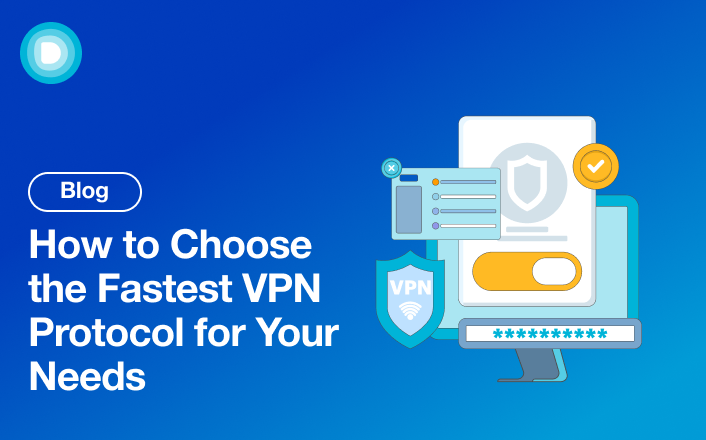- Product
-
Solution
-
By Industry
Cybersecurity solutions tailored to your industry’s needs.
-
- Resources
-
Books
Our ultimate guides and playbooks
Solution Briefs
Overview of PureDome’s functionality
-
Quizzes
Assess your cybersecurity readiness
Case Studies
PureDome customer success stories
Newsletter
Subscribe to the PureDome newsletter
-
- About Us
- Partner
- Pricing
- Download
How to Choose the Fastest VPN Protocol for Your Needs
-
Aiman Ikram
-
30 Jan 2024
- 3 min read


VPN Protocols Guide – Which VPN Protocol Is The Fastest?
In an era where online privacy and security are paramount, the quest for the fastest VPN protocol has become a critical consideration for many internet users. With an array of VPN protocols to choose from, each promising its own blend of speed and security, it can be challenging to discern which one truly reigns supreme in the speed department. In this comprehensive guide, we'll dissect the world of VPN protocols, exploring their intricacies and highlighting the need-to-know details. By the end, you'll be equipped with the knowledge to make an informed choice and understand which VPN protocol takes the crown as the fastest.
What Are VPN Protocols and Why Do They Matter?
Before diving into the race to identify the fastest VPN protocol, let's grasp the fundamentals. In essence, a VPN protocol is a set of rules governing the establishment of a secure connection between your device and a VPN server. Think of these protocols as the architects behind the secure tunnels that encapsulate your internet traffic, ensuring it remains private and shielded from prying eyes.
A VPN protocol is the backbone of any VPN service, and its importance cannot be overstated. It's the linchpin that determines how your data is encrypted, transmitted, and ultimately secured. Choosing the right protocol is crucial as it directly impacts factors like speed, security, and compatibility. The ideal VPN protocol strikes a balance between speed and security, aligning with your specific online activities and needs.
Common VPN Protocols
In the vast landscape of VPN protocols, several have emerged as prominent contenders. Let's explore some of the most common ones, shedding light on their strengths and weaknesses:
| VPN Protocol | Pros | Cons |
| OpenVPN | - High security - Supported by many VPN services - Good compatibility with firewalls |
- Difficult to configure manually - Consumes more bandwidth - Not the fastest protocol |
| IKEv2/IPsec | - Good speed and latency - High stability when switching connections - Less bandwidth usage |
- Only uses UDP port 500 - Can be blocked easily - Not open source |
| WireGuard | - High speeds - Open-source code base - Less bandwidth usage |
- Compatibility limitations with AES-256 - Temporarily logs users' IP addresses - Only compatible with UDP |
| SSTP | - Simple to use - Can bypass firewalls - Comes integrated into Windows |
- Not open source - Not suitable for high security - Incompatibility with non-Windows platforms |
| L2TP/IPsec | - Supported by almost all platforms - Easy to set up - Supports multithreading |
- Lack of trust and security - Not compatible with NAT - Communicates over UDP only |
| PPTP | - Fast speeds - Compatibility with almost all platforms - Low costs and easy installation |
- Low performance on unstable networks - Lack of security - Easily blocked by firewalls |
Now that we've acquainted ourselves with the contenders, let's address the critical question:
Choosing the Right VPN Protocol for Your Needs
Selecting the ideal VPN protocol is a critical decision that depends on your specific online activities and priorities. Whether you value speed, security, stability, or ease of use, understanding the strengths and limitations of each protocol ensures an optimized and secure online experience.
Fastest VPN Protocol: Speed Without Compromise
When speed is your top priority, WireGuard is the clear choice. Its lightweight design and reliance on UDP make it one of the fastest VPN protocols available. This streamlined approach not only accelerates connection speeds but also simplifies security audits with its compact codebase. Whether you're gaming, streaming, or performing bandwidth-intensive tasks, WireGuard delivers exceptional performance.
Most Secure VPN Protocol: Prioritizing Privacy
For users who value security above all else, OpenVPN is the gold standard. Known for its robust AES 256-bit encryption and reliance on SSL/TLS for secure key exchanges, OpenVPN offers unparalleled protection for sensitive data. Its adaptability across different operating systems and platforms makes it a reliable choice for those seeking comprehensive security measures.
Most Stable VPN Protocol: Seamless Connections
Frequent travelers or users constantly switching networks require a stable and reliable protocol. IKEv2/IPsec is designed to maintain seamless connections even when transitioning between Wi-Fi and mobile data. While it offers impressive stability, users should be mindful of its slightly lower security compared to OpenVPN.
VPN Protocols and Ease of Use
If ease of setup is your main concern, PPTP might catch your attention due to its widespread compatibility and pre-installed presence on many devices. However, its outdated security features and vulnerabilities render it unsuitable for modern use, especially when privacy is critical.
VPN Protocols for Businesses: Balancing Security and Functionality
For businesses, selecting the right VPN protocol depends on operational needs. OpenVPN often leads the pack due to its strong encryption and versatility, making it ideal for secure remote access to corporate networks. Alternatively, businesses may explore proprietary protocols for specialized requirements tailored to organizational infrastructure
Finding Your Perfect VPN Protocol
Choosing the best VPN protocol is not a one-size-fits-all decision. Each protocol serves distinct purposes, and your selection should align with your specific needs. Whether you prioritize speed for streaming, stability for seamless connections, or top-tier security for sensitive data, understanding the nuances of each protocol ensures a secure and efficient online experience.
Frequently Asked Questions
What is a VPN protocol, and why does it matter?
A VPN protocol is a set of rules that govern how your internet data is encrypted, transmitted, and secured when using a VPN service. It matters because the choice of protocol directly impacts your online experience, affecting factors like speed, security, and compatibility with various devices and activities.
Which VPN protocol is the fastest?
WireGuard is widely considered the fastest VPN protocol due to its streamlined code, focus on efficiency, and use of UDP for faster data transmission. However, the fastest protocol can vary depending on your specific use case and priorities.
Is WireGuard the most secure VPN protocol?
While WireGuard offers impressive speed, it may not be the most secure protocol for all users. OpenVPN, with its robust developer community and military-grade AES 256-bit encryption, is often considered the most secure VPN protocol.
Why would I choose IKEv2/IPsec for mobile devices?
IKEv2/IPsec is an excellent choice for mobile users due to its fast connection speeds and seamless transition between different networks, such as Wi-Fi and cellular data. It provides stability while on the move.
Stay up to date with the latest cybersecurity insights and best practices
Get the latest information, stories, and resources in your inbox. Subscribe for monthly updates.
Securing 1000+ Businesses Across The World